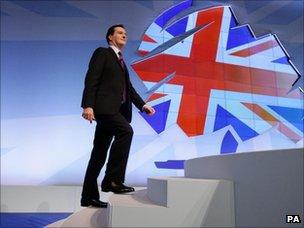Osborne hopes to ‘ease’ business credit
- Published
- comments

The chancellor's announcement that the Treasury is preparing to engage in what he called "credit easing" is potentially very significant.
It would involve the public sector buying bonds issues by companies - in an attempt to cut the cost of credit for companies, and also boost the supply of credit.
There will be no firm announcement till George Osborne's autumn statement in November.
But officials have given me the following details.
Credit easing would involve billions of pounds of public finance. This money would be used to buy corporate bonds.
Initially the bonds would be those issued by big companies. And the Treasury would probably only undertake to purchase these bonds in the event of a further worsening in the eurozone's financial crisis that seriously reduced the provision of credit to businesses.
Such bond purchases could, in theory, start almost immediately, via a reactivation of the Bank of England's asset purchase facility - which was created in early 2009 but has barely been used.
In the longer term, the impact of credit easing on the flow of credit to smaller businesses could be more significant - because the Treasury is hoping to encourage the creation of bonds made out of small-business loans, by promising to buy such small-business bonds and thus create a market for them.
The idea is to encourage banks to parcel up small business loans into such bonds.
The model for all of this is what happens in the US - where there is already a much bigger market for tradable corporate debt and where in 2009 the US Federal Reserve engaged in pretty significant credit easing.
The purchase of corporate debt under a future British scheme would probably be carried out on behalf of the Treasury by the Bank of England. But the risk would sit on the Treasury's balance sheet.
Treasury officials say that these purchases would not add to the UK's deficit or the national debt, under the standard accounting rules, because the Treasury would be purchasing a tradable asset.
Even so, there would be risks to the public sector from making these purchases.
Update, 14:55: I have two further thoughts about the credit easing announcement.
First it demonstrates - if such demonstration were needed - that the Treasury is seriously worried that deterioration in the eurozone's financial crisis could lead to a full scale credit crunch, since phase one of credit easing would be designed to keep the supply of loans flowing to businesses in those appalling circumstances.
Second, it's proof the Treasury has given up hope that - in the absence of structural reform of the credit market - small businesses will find it any cheaper or easier to borrow, even in the longer term.
The Treasury may indeed be fearful that the Project Merlin agreement with the UK's big banks, which sets targets for business lending in 2011, is at best short-term sticking plaster - and at worst, the banks may yet miss their Merlin targets.